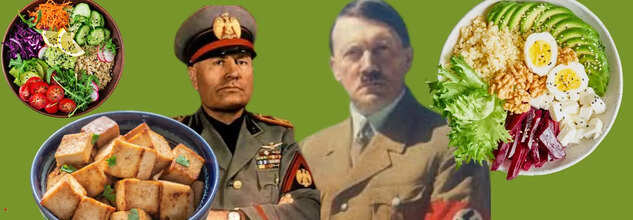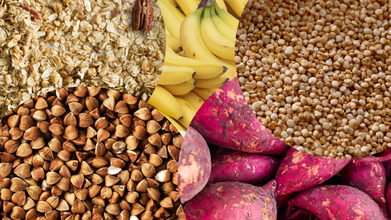- Health Conditions A-Z
- Health & Wellness
- Nutrition
- Fitness
- Health News
- Ayurveda
- Videos
- Medicine A-Z
- Parenting
- Web Stories
Dictator Diet: Hitler, Mussolini And Gaddafi-What They Ate Everyday

Dictator Diet (Credit: Canva)
German dictator Adolf Hitler was a vegetarian while his Italian counterpart Benito Mussolini loved salads. Both these facts are hard to believe, given the fact that these leaders were known to be "blood thirsty" and infamous for their notorious execution methods. However, when it came to their diet, not only did they kept it simple but also had a very solid reason behind it-gastrointestinal problems.
Dictators including Hitler, Mussolini, Mao Zedong and Muammar Gaddafi had one thing in common. All of them suffered from gastrointestinal (GI) problems. Hitler and Gaddafi, both suffered from chronic flatulence. In this condition, a person has excessive gas in their intestines. Hitler was so troubled by it that in desperation, he allowed a quack, Dr Theodor Morell, to dose him with 28 different medicines, including one made from the extract of feces of healthy young German soldiers. On the other hand, Gaddafi seemed to have been untroubled by this affliction. He unabashedly farted on!
Besides medicine, Hitler also sticked to a strict Vegetarian diet in an attempt to cure his stomach issues. He believed that a meatless diet would relive his flatulence and constipation. Towards the last stages of his life, he took only clear soup and mashed potatoes, as reported by The Print.
8 Cups Of This Drink Can Help Increase Your Longevity But More Than That Could Increase Your Risk Of Heart Diseases

(Credit-Canva)
One of the major point of conversations right now is longevity. People are learning day by day about what may affect their biological age and how, why and which way they can lower it. Many studies have pointed out that things like sugar, and some drinks may lower it, however, a new study shows that there may be some unexpected heroes among our daily drink consumption.
A study recently published in the British Journal of Nutrition showed something interesting: drinking about seven to eight cups of tea, coffee, and plain water every day might help you live longer.
Researchers looked at the drinking habits of over 182,000 people and found that hitting this total number of drinks, when balanced well, offered the best protection. It lowered the risk of dying from all kinds of serious problems, including cancer and heart disease. The main finding is that the mix of drinks is key—it's not good to overdo it, as too much might actually be bad for your heart.
How Do Tea, Coffee Or Water Help Your Health?
The research figured out the best possible way to combine these drinks to get the most health benefit:
Optimal Daily Total
The number one rule is to drink a total of seven to eight beverages every day. This total includes your water, coffee, and tea.
Coffee and Tea Ratio
Once you're hitting that daily goal, the best way to mix the coffee and tea is in a 2:3 ratio. This means for every two cups of coffee, you should have three cups of tea. This specific blend was found to be the most powerful for protecting you against dying from heart problems, cancer, and diseases of the lungs and stomach.
Hydration
The experts stress that the most important thing is to just stay hydrated first. Get your total number of drinks up to seven or eight. After you've done that, then you can start swapping some of your water for the healthier mix of coffee and tea.
How Much Tea Or Coffee Should You Drink?
The study also came with important warnings about drinking too much or too little of the mix:
If You Drink Very Little: If you currently have less than four total drinks a day, just adding a cup of coffee or tea won't help much. You need to focus on drinking more water first to reach the main goal of being fully hydrated.
If You Drink Too Much: If you are drinking nine or more cups of fluid a day, replacing water with more tea or coffee could actually raise your risk of dying from heart disease. More is not always better! Finally, the scientists noted two important things:
They can only say there's a link (an observation) between the drinks and living longer; they can't say for sure that the drinks are the direct cause of longer life. The study didn't know how people prepared their drinks—whether they added a lot of sugar or milk, which could affect the health benefits. The main takeaway is to focus on getting your overall daily fluid intake to seven to eight drinks and then use the beneficial mix of coffee and tea wisely.
Gemma Atkinson Says Keto Diet Has Helped Her Daughter With Epilepsy

Credits: Canva
Former Hollyoaks star Gemma Atkinson's six-year-old daughter is undergoing treatment for epilepsy. Gemma revealed that Mia, her daughter's condition was discovered after she began to experience absence seizures and episodes of lost awareness.
Gemma spoke about Mia's health journey on her podcast Just As Well, the Women's Health Podcast. She explained how the diagnosis has shaped her family’s lifestyle and highlighted the critical role diet can play in managing epilepsy.
What Are Absence Seizures?
As per CDC, epilepsy is a neurological condition that affects the brain and causes recurrent seizures. These seizures can take many forms, from convulsions to subtle lapses in awareness. In Mia’s case, she suffers from absence seizures. These episodes typically last a few seconds, during which the child appears to be staring blankly or “switching off.” While they may seem mild, repeated episodes can disrupt learning, daily activities, and overall quality of life.
Although epilepsy cannot be cured, treatments ranging from medication to lifestyle interventions can help control seizures. For Mia, medical professionals suggested that diet could play a significant role in supporting brain health.
Can Diet Help Your Brain?
Gemma also shared that the doctors have recommended ketogenic diet or the keto diet for Mia. This means Mia can have food high in fats, moderate in protein, and low in carbohydrates.
The diet was first introduced in the 1920s, was originally developed as a treatment for epilepsy before the advent of modern medications. Research shows that it can help rewire brain function and reduce seizure activity, particularly in children who do not respond well to standard treatments.
“The doctor told me, ‘If you can get her on a keto diet, it could help with brain function,’” Gemma explained. “The improvement we’ve had has been amazing. For the last six months, she’s had no seizures at all, touch wood.”
Mia now starts her day with an omelet for breakfast and Gemma also adds extra nutrients like collagen to her yogurt. While the diet requires careful planning and strict adherence, it has brought encouraging results, with both the family and Mia’s school reporting a significant reduction in symptoms.
Despite the positive progress, Gemma emphasized that Mia’s condition requires ongoing monitoring. Epilepsy management often involves regular check-ups, symptom tracking, and dietary adjustments. “We’re constantly monitoring her, but the last year has been such a positive turnaround,” she said.
Experts caution that while the keto diet can be beneficial, it must be followed under medical supervision to avoid nutritional imbalances. Gemma’s proactive approach, researching the condition and working closely with healthcare professionals, has given Mia a strong foundation for managing her epilepsy.
Epilepsy Awareness
Gemma is bringing public's attention to epilepsy, a condition that is often misunderstood or overlooked. bsence seizures, in particular, may go unnoticed by parents or teachers, as they can resemble daydreaming. Raising awareness can help families recognize the signs early and seek timely medical advice.
Epilepsy affects millions worldwide, and while it cannot yet be cured, advancements in diet-based therapy, medication, and supportive care continue to improve outcomes.
Are All Carbs Bad? Here Are 5 Healthy Carbs You Can Try

Credits: Canva
For years, people have been scared of carbohydrates. It is seen as the 'No-No' in the food world. Wherever you look round, if you want to lose weight, or get fit, you are often told to not consume carbohydrates.
The term carbohydrate itself has been cast as the villain of the nutrition world. Many popular diets and fitness trends often link them to weight gain, type 2 diabetes, and a host of chronic conditions. But nutrition experts stress that not all carbs are created equal.
While heavily processed foods loaded with sugar and refined flour do raise health concerns, there are many carbohydrate-rich foods are nutrient-dense, fiber-packed, and highly beneficial for overall well-being. In fact, they are healthy and even recommended. Often in the garb of what social media tells us, we miss them out. You would be shocked to know that some of the healthiest staples in our diets, from whole grains to tubers and fruits, fall into the high-carb category.
Here’s a closer look at five high-carb foods that not only provide energy but also deliver significant nutritional value.
Quinoa
Quinoa, often mistaken for a grain, is actually a seed classified as a pseudocereal. Over the past decade, it has become a star ingredient in health-conscious kitchens worldwide.
Cooked quinoa is about 70% carbohydrate, but its nutritional profile goes far beyond carbs. It offers a balanced combination of fiber, protein, and essential minerals. Studies link quinoa consumption to better blood sugar management and improved heart health, thanks to its abundance of plant compounds and antioxidants.
Another major advantage? Quinoa is naturally gluten-free, making it a popular alternative for those with wheat sensitivities. Its high fiber and protein content also make it particularly filling, which can support both weight management and digestive health.
Oats
Few foods embody the phrase “comfort and health” quite like oats. Known as one of the healthiest whole grains, oats deliver a rich blend of vitamins, minerals, and antioxidants.
Raw oats are about 70% carbohydrate, with a single cup providing 54 grams of carbs—including 8 grams of fiber. Of special note is beta-glucan, a type of soluble fiber unique to oats that has been extensively studied for its heart-protective effects.
Research shows that eating oats regularly can lower cholesterol levels, reduce the risk of heart disease, and help manage blood sugar—particularly in people with type 2 diabetes. They’re also more protein-rich than most other grains, and their satiating quality makes them an excellent choice for weight management.
Buckwheat
Despite its name, buckwheat has no relation to wheat and is entirely gluten-free. Like quinoa, it belongs to the pseudocereal family and offers a nutritional punch that rivals traditional grains.
Raw buckwheat contains 75 grams of carbohydrates per 100 grams, while cooked groats contain nearly 20 grams. Beyond its carb content, buckwheat is rich in protein, fiber, and an impressive array of antioxidants and minerals.
Early studies suggest it may support heart health by improving blood pressure and cholesterol levels, as well as aiding blood sugar control, an especially valuable benefit for people at risk of diabetes. Its versatility in both sweet and savory dishes also makes it a practical choice for everyday meals.
Bananas
Bananas have long been a go-to snack for athletes, children, and anyone in need of quick energy. A large banana provides about 31 grams of carbohydrates, primarily from natural sugars and starch.
But bananas aren’t just about energy. They’re packed with potassium, vitamin C, and vitamin B6, along with helpful plant compounds. High potassium levels are particularly beneficial for heart health, helping to regulate blood pressure and support proper muscle and nerve function.
Interestingly, the ripeness of a banana changes its nutritional makeup. Green, unripe bananas contain more resistant starch, a type of carbohydrate that acts like fiber, feeding beneficial gut bacteria and supporting digestive health. As bananas ripen, starch turns into natural sugars, making them sweeter but less fibrous. Both versions, however, have health benefits.
Sweet Potatoes
Vibrant, versatile, and naturally sweet, sweet potatoes are another carbohydrate-rich food with outstanding nutritional value. A half-cup serving of cooked sweet potatoes with skin provides about 21 grams of carbohydrates, along with fiber, sugar, and starch.
They also contain key vitamins and minerals, particularly vitamin A (in the form of beta-carotene), vitamin C, and potassium. These nutrients play essential roles in vision, immunity, and overall cell health.
Perhaps most impressive, sweet potatoes are loaded with antioxidants—compounds that fight free radicals and may reduce the risk of chronic diseases like cancer and cardiovascular conditions. Their natural sweetness also makes them a healthier alternative to refined carb-based desserts or snacks.
Should You Rethink What Carbs Mean?
The bad reputation surrounding carbohydrates often overlooks a crucial fact: carbs are the body’s primary source of energy. What matters most is the type of carbs consumed. Refined, sugar-laden options offer little nutrition, while whole-food sources like quinoa, oats, buckwheat, bananas, and sweet potatoes deliver fiber, vitamins, minerals, and powerful antioxidants.
For most people, there’s no need to shun high-carb foods. Instead, the focus should be on choosing unprocessed, nutrient-dense varieties that nourish the body while providing steady energy.
As nutrition experts continue to emphasize, balance and quality, not restriction, are the true keys to a healthy diet.
© 2024 Bennett, Coleman & Company Limited

